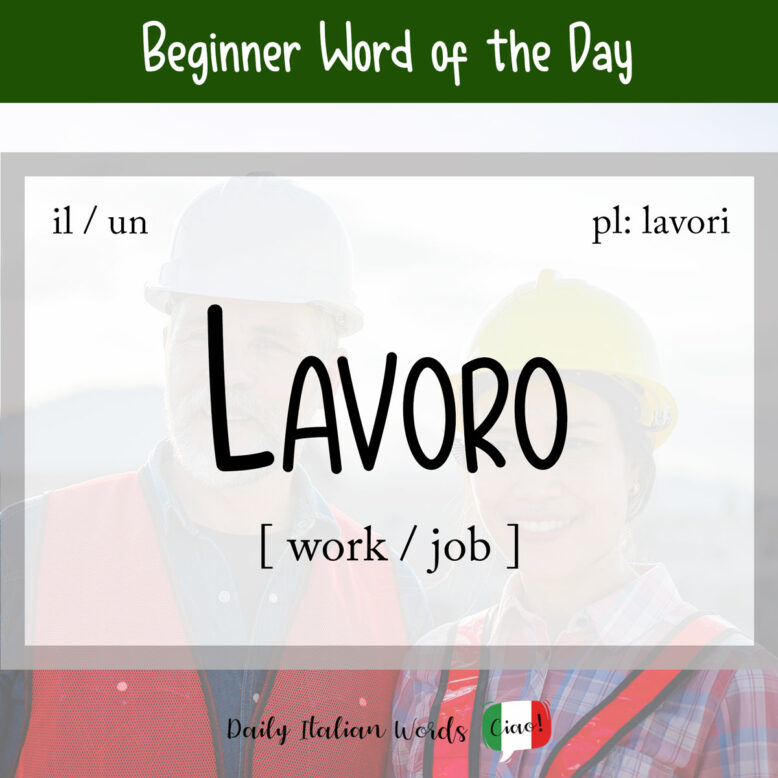A word that consistently makes it onto the list of the top 100 most common words in Italian is lavoro. It derives from the verb lavorare (to work), which in turn comes from the Latin ‘laborare’ (to toil).

Because it is a masculine noun, lavoro takes the following definite and indefinite articles:
il lavoro
un lavoro
i lavori
dei lavori
When lavoro appears in its singular form, the translation is usually one of work, job, labor or employment depending on the context. For example:
Ho tanto lavoro da finire entro domani.
I have a lot of work to finish by tomorrow.
Non mi ispira molto questo nuovo lavoro.
I’m not overly keen on this new job.
Il lavoro manuale è sempre più richiesto.
Manual labour is increasingly in demand.
Il mio contratto di lavoro non sarà rinnovato.
My employment contract will not be renewed.

In its plural form lavori, the translation is almost always jobs, or one of its synonyms such as tasks, chores or activities. For example, interesting jobs becomes lavori interessanti in Italian, whereas household chores translates as lavori domestici. One common exception is lavori stradali (often shortened to just lavori), which is how you would say roadworks in Italian.
Ci sono vari tipi di lavori che la gente non ha più voglia di fare.
There are various types of jobs that people don’t want to do anymore.
Lavoro and its plural lavori can also refer to a piece of work produced by an artist, writer or musician (e.g. i lavori di Monet = the works of Monet).
Here is just a handful of common verbs you will see used with lavoro:
- mettersi al lavoro = to get to work
- essere al lavoro = to be at work
- cercare lavoro = to look for a job
- andare al lavoro = to go to work
- tornare dal lavoro = to come back from work
- perdere il lavoro = to lose one’s job
- fare un buon/bel lavoro = to do a good job
- viaggiare per lavoro = to travel for work
- parlare di lavoro = to talk shop
- avere un lavoro = to have a job
- essere senza lavoro = to be unemployed
Note that fare un bel lavoro can also be used ironically to say someone has made a big mess.

Some of the ways in which jobs can be classified include:
- un lavoro a tempo pieno = full-time job
- un lavoro a tempo parziale = part-time job
- un lavoro temporaneo = a temporary job
- un lavoro permanente = a permanent job
- un lavoro stagionale = a seasonable job
Un colloquio di lavoro is a job interview, whereas il datore di lavoro (lit. the giver of jobs) is another term for employer in Italian. You can also use lavoro to indicate the duration of time that you’re performing the job.
Non voglio essere disturbato durante il lavoro.
I don’t want to be disturbed when I work.
Many Italian nouns have diminutive and augmentative forms, and lavoro is no exception. The diminutive lavoretto (with the -etto suffix) refers to an odd job or a part-time job, whereas the augmentative lavorone (with the -one suffix) describes a very demanding job. Lavoraccio, with the -accio suffix used to form pejoratives, may refer to either a tiring and difficult job or a botched-up job.
Finally, if you describe a job as being un lavoro da certosino (lit. a Carthusian monk’s job), the implication is that the job is so meticulously executed as to be worthy of a monk.
Heather Broster is a graduate with honours in linguistics from the University of Western Ontario. She is an aspiring polyglot, proficient in English and Italian, as well as Japanese, Welsh, and French to varying degrees of fluency. Originally from Toronto, Heather has resided in various countries, notably Italy for a period of six years. Her primary focus lies in the fields of language acquisition, education, and bilingual instruction.


